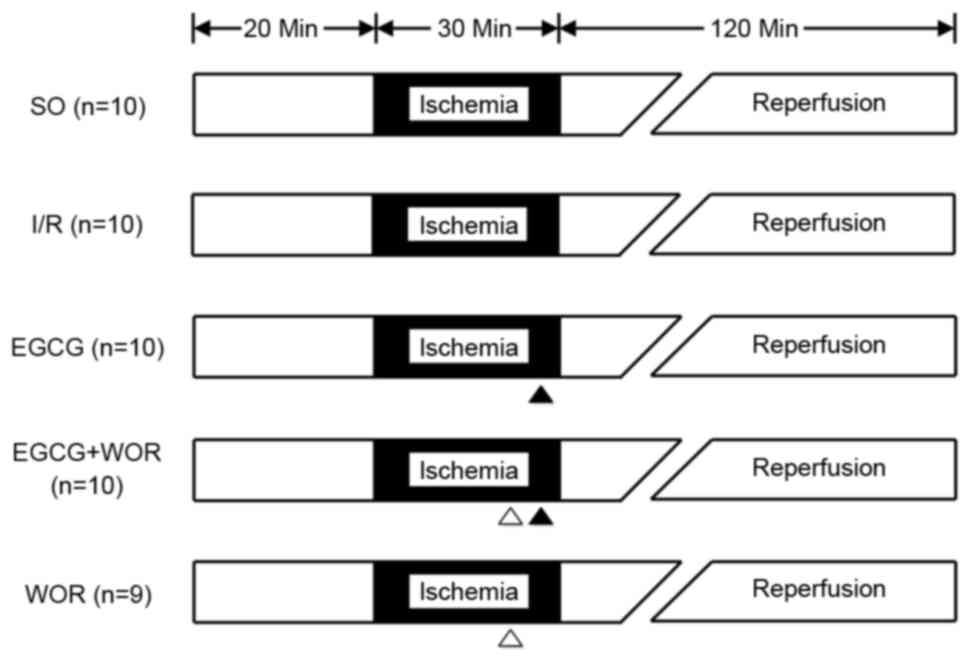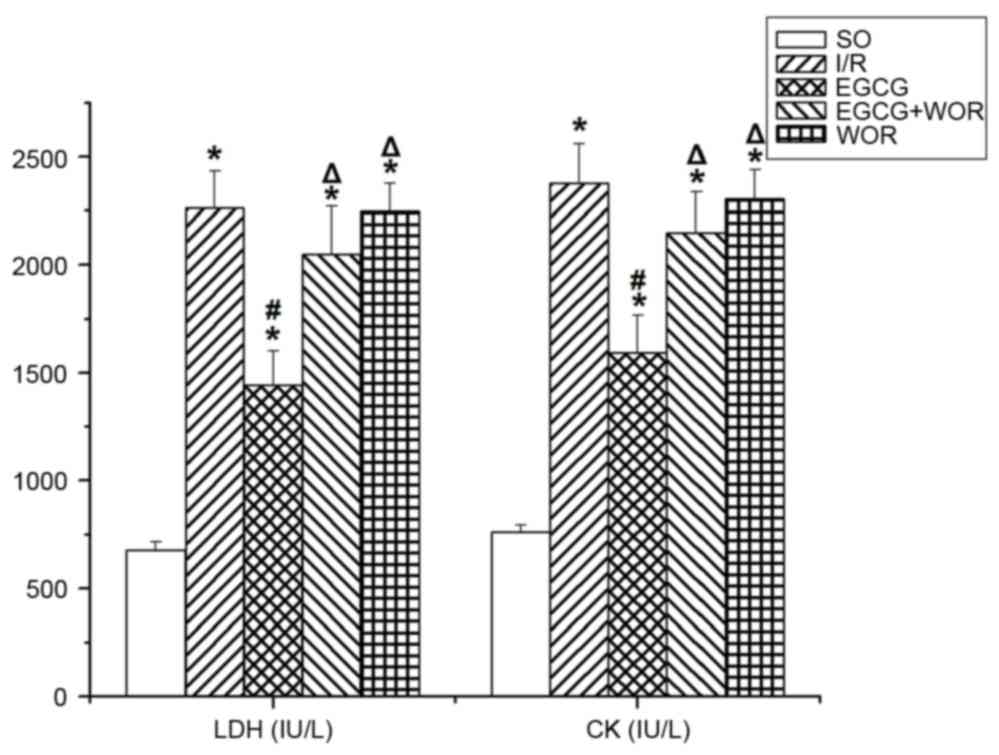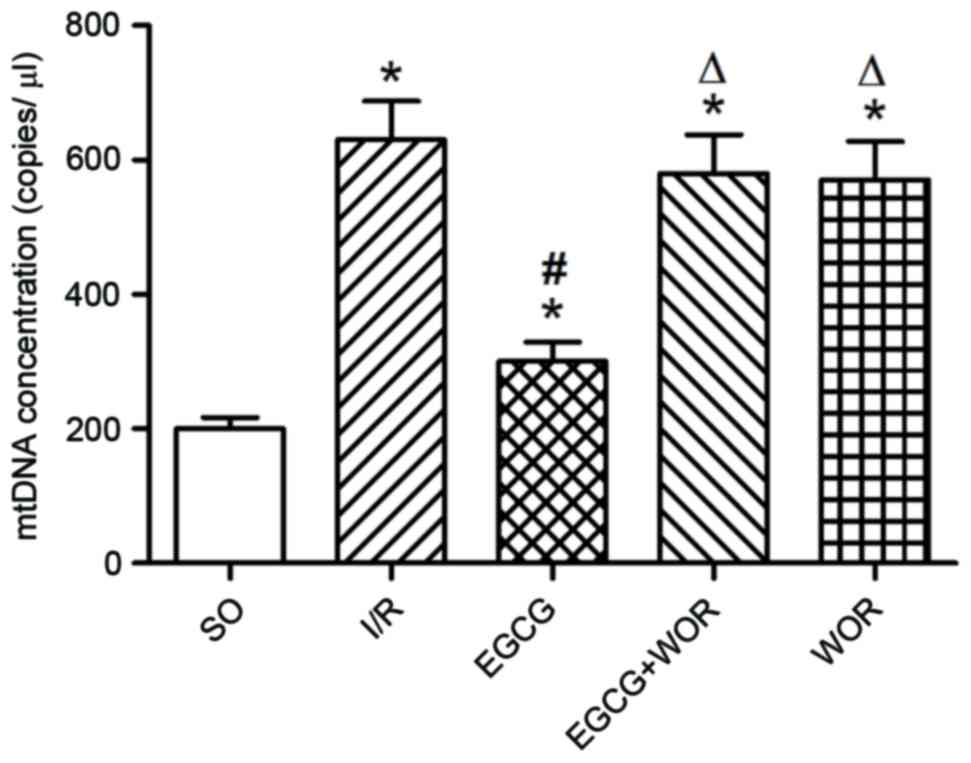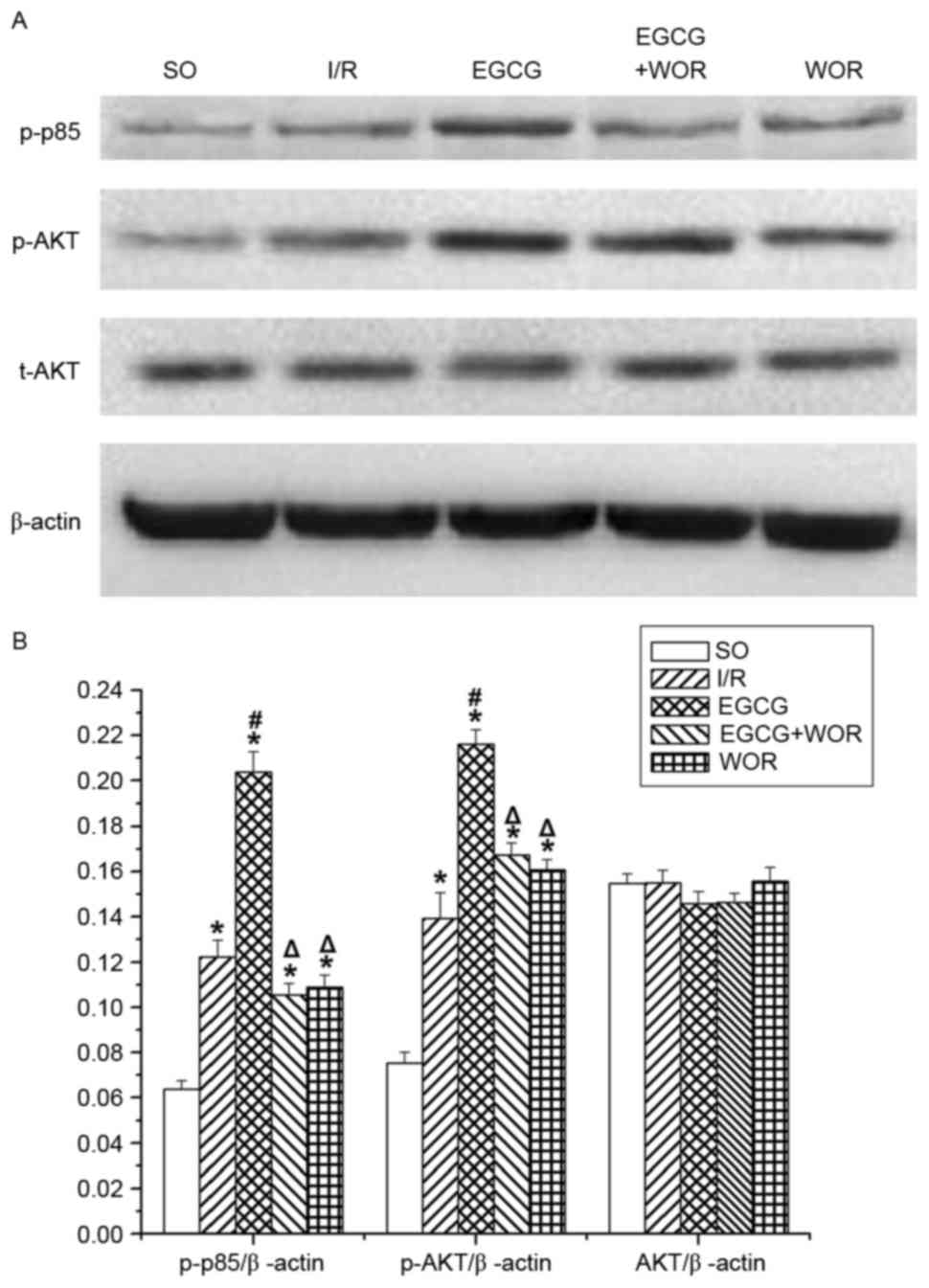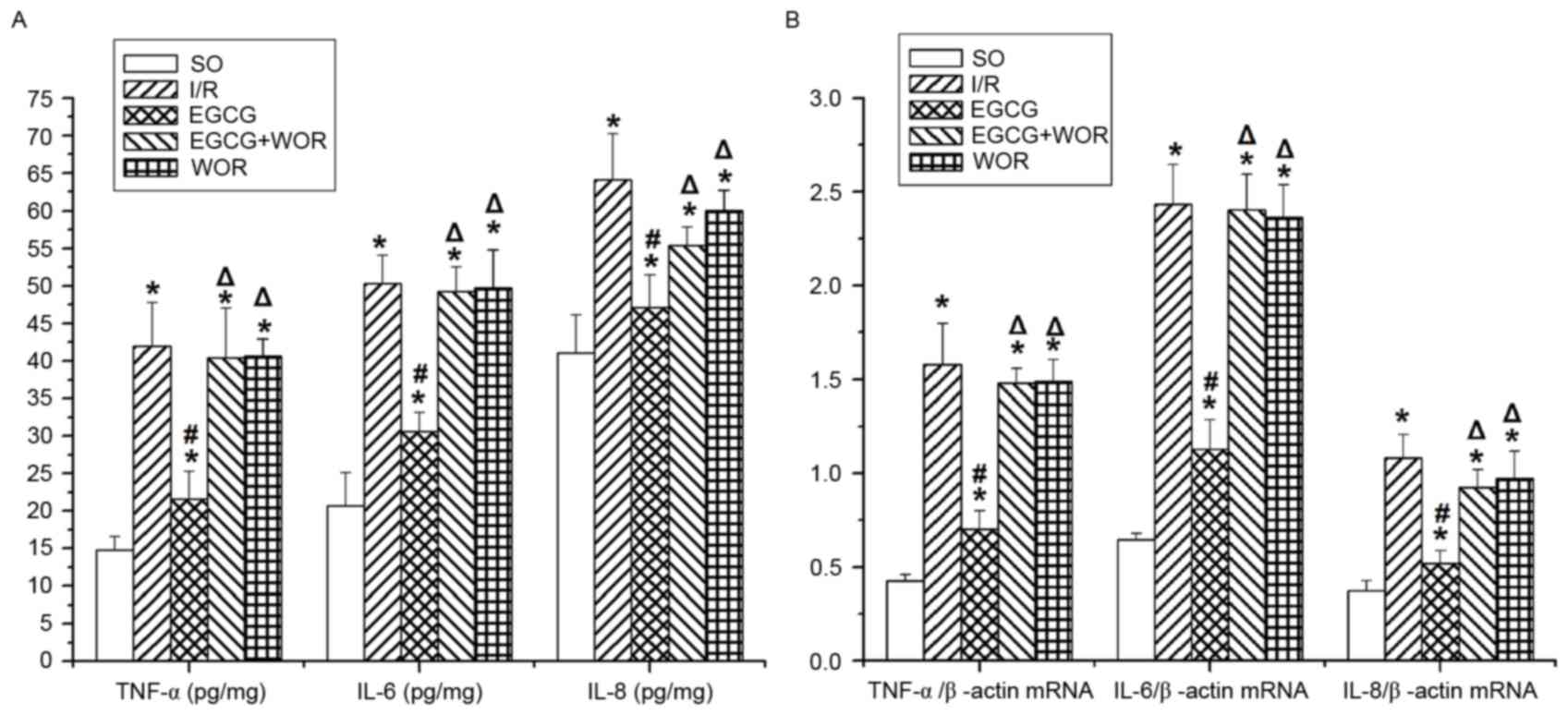|
1
|
Go AS, Mozaffarian D, Roger VL, Benjamin
EJ, Berry JD, Blaha MJ, Dai S, Ford ES, Fox CS, Franco S, et al:
Heart disease and stroke statistics-2014 update: A report from the
American Heart Association. Circulation. 129:e28–e292. 2014.
View Article : Google Scholar : PubMed/NCBI
|
|
2
|
Carrick D and Berry C: Prognostic
importance of myocardial infarct characteristics. Eur Heart J
Cardiovasc Imaging. 14:313–315. 2013. View Article : Google Scholar : PubMed/NCBI
|
|
3
|
Minamino T: Cardioprotection from
ischemia/reperfusion injury: Basic and translational research. Circ
J. 76:1074–1082. 2012. View Article : Google Scholar : PubMed/NCBI
|
|
4
|
Hausenloy DJ and Yellon DM: Myocardial
ischemia-reperfusion injury: A neglected therapeutic target. J Clin
Invest. 123:92–100. 2013. View
Article : Google Scholar : PubMed/NCBI
|
|
5
|
Sanada S, Komuro I and Kitakaze M:
Pathophysiology of myocardial reperfusion injury: Preconditioning,
postconditioning, and translational aspects of protective measures.
Am J Physiol Heart Circ Physiol. 301:H1723–H1741. 2011. View Article : Google Scholar : PubMed/NCBI
|
|
6
|
Zhang Q, Raoof M, Chen Y, Sumi Y, Sursal
T, Junger W, Brohi K, Itagaki K and Hauser CJ: Circulating
mitochondrial DAMPs cause inflammatory responses to injury. Nature.
464:104–107. 2010. View Article : Google Scholar : PubMed/NCBI
|
|
7
|
Yue R, Xia X, Jiang J, Yang D, Han Y, Chen
X, Cai Y, Li L, Wang WE and Zeng C: Mitochondrial DNA oxidative
damage contributes to cardiomyocyte ischemia/reperfusion-injury in
rats: Cardioprotective role of lycopene. J Cell Physiol.
230:2128–2141. 2015. View Article : Google Scholar : PubMed/NCBI
|
|
8
|
Zhang JZ, Liu Z, Liu J, Ren JX and Sun TS:
Mitochondrial DNA induces inflammation and increases TLR9/NF-κB
expression in lung tissue. Int J Mol Med. 33:817–824. 2014.
View Article : Google Scholar : PubMed/NCBI
|
|
9
|
Williams DL, Ozment-Skelton T and Li C:
Modulation of the phosphoinositide 3-kinase signaling pathway
alters host response to sepsis, inflammation, and
ischemia/reperfusion injury. Shock. 25:432–439. 2006. View Article : Google Scholar : PubMed/NCBI
|
|
10
|
Hu G, Huang X, Zhang K, Jiang H and Hu X:
Anti-inflammatory effect of B-Type natriuretic peptide
postconditioning during myocardial ischemia-reperfusion:
Involvement of PI3K/Akt signaling pathway. Inflammation.
37:1669–1674. 2014. View Article : Google Scholar : PubMed/NCBI
|
|
11
|
Wynne AM, Mocanu MM and Yellon DM:
Pioglitazone mimics preconditioning in the isolated perfused rat
heart: A role for the prosurvival kinases PI3K and P42/44MAPK. J
Cardiovasc Pharmacol. 46:817–822. 2005. View Article : Google Scholar : PubMed/NCBI
|
|
12
|
Boucher M, Pesant S, Falcao S, de Montigny
C, Schampaert E, Cardinal R and Rousseau G: Post-ischemic
cardioprotection by A2A adenosine receptors: Dependent of
phosphatidylinositol 3-kinase pathway. J Cardiovasc Pharmacol.
43:416–422. 2004. View Article : Google Scholar : PubMed/NCBI
|
|
13
|
Giakoustidis DE, Giakoustidis AE, Iliadis
S, Koliakou K, Antoniadis N, Kontos N, Papanikolaou V, Papageorgiou
G, Kaldrimidou E and Takoudas D: Attenuation of liver
ischemia/reperfusion induced apoptosis by
epigallocatechin-3-gallate via down-regulation of NF-kappaB and
c-Jun expression. J Surg Res. 159:720–728. 2010. View Article : Google Scholar : PubMed/NCBI
|
|
14
|
Al-Maghrebi M, Renno WM and Al-Ajmi N:
Epigallocatechin-3-gallate inhibits apoptosis and protects
testicular seminiferous tubules from ischemia/reperfusion-induced
inflammation. Biochem Biophys Res Commun. 420:434–439. 2012.
View Article : Google Scholar : PubMed/NCBI
|
|
15
|
Kim HS, Quon MJ and Kim JA: New insights
into the mechanisms of polyphenols beyond antioxidant properties;
lessons from the green tea polyphenol, epigallocatechin 3-gallate.
Redox Biol. 2:187–195. 2014. View Article : Google Scholar : PubMed/NCBI
|
|
16
|
Qin C, Liu R, Gu J, Li Y, Qian H, Shi Y
and Meng W: Variation of perioperative plasma mitochondrial DNA
correlate with peak inflammatory cytokines caused by cardiac
surgery with cardiopulmonary bypass. J Cardiothorac Surg.
10:852015. View Article : Google Scholar : PubMed/NCBI
|
|
17
|
Livak KJ and Schmittgen TD: Analysis of
relative gene expression data using real-time quantitative PCR and
the 2(-Delta Delta C(T)) method. Methods. 25:402–408. 2001.
View Article : Google Scholar : PubMed/NCBI
|
|
18
|
Miller LE, Hosick PA, Wrieden J, Hoyt E
and Quindry JC: Evaluation of arrhythmia scoring systems and
exercise-induced cardioprotection. Med Sci Sports Exerc.
44:435–441. 2012. View Article : Google Scholar : PubMed/NCBI
|
|
19
|
Kim JA, Formoso G, Li Y, Potenza MA,
Marasciulo FL, Montagnani M and Quon MJ: Epigallocatechin gallate,
a green tea polyphenol, mediates NO-dependent vasodilation using
signaling pathways in vascular endothelium requiring reactive
oxygen species and Fyn. J Biol Chem. 282:13736–13745. 2007.
View Article : Google Scholar : PubMed/NCBI
|
|
20
|
Elbling L, Weiss RM, Teufelhofer O, Uhl M,
Knasmueller S, Schulte-Hermann R, Berger W and Micksche M: Green
tea extract and (−)-epigallocatechin-3-gallate, the major tea
catechin, exert oxidant but lack antioxidant activities. FASEB J.
19:807–809. 2005.PubMed/NCBI
|
|
21
|
Potenza MA, Marasciulo FL, Tarquinio M,
Tiravanti E, Colantuono G, Federici A, Kim JA, Quon MJ and
Montagnani M: EGCG, a green tea polyphenol, improves endothelial
function and insulin sensitivity, reduces blood pressure, and
protects against myocardial I/R injury in SHR. Am J Physiol
Endocrinol Metab. 292:E1378–E1387. 2007. View Article : Google Scholar : PubMed/NCBI
|
|
22
|
Ai W, Zhang Y, Tang QZ, Yan L, Bian ZY,
Liu C, Huang H, Bai X, Yin L and Li H: Silibinin attenuates cardiac
hypertrophy and fibrosis through blocking EGFR-dependent signaling.
J Cell Biochem. 110:1111–1122. 2010. View Article : Google Scholar : PubMed/NCBI
|
|
23
|
Cao H, Ye H, Sun Z, Shen X, Song Z, Wu X,
He W, Dai C and Yang J: Circulatory mitochondrial DNA is a
pro-inflammatory agent in maintenance hemodialysis patients. PLoS
One. 9:e1131792014. View Article : Google Scholar : PubMed/NCBI
|
|
24
|
Pinti M, Cevenini E, Nasi M, De Biasi S,
Salvioli S, Monti D, Benatti S, Gibellini L, Cotichini R, Stazi MA,
et al: Circulating mitochondrial DNA increases with age and is a
familiar trait: Implications for ‘inflamm-aging’. Eur J Immunol.
44:1552–1562. 2014. View Article : Google Scholar : PubMed/NCBI
|
|
25
|
Zhou R, Yazdi AS, Menu P and Tschopp J: A
role for mitochondria in NLRP3 inflammasome activation. Nature.
469:221–225. 2011. View Article : Google Scholar : PubMed/NCBI
|
|
26
|
Yao X, Carlson D, Sun Y, Ma L, Wolf SE,
Minei JP and Zang QS: Mitochondrial ROS induces cardiac
inflammation via a pathway through mtDNA damage in a
pneumonia-related sepsis model. PLoS One. 10:e01394162015.
View Article : Google Scholar : PubMed/NCBI
|















